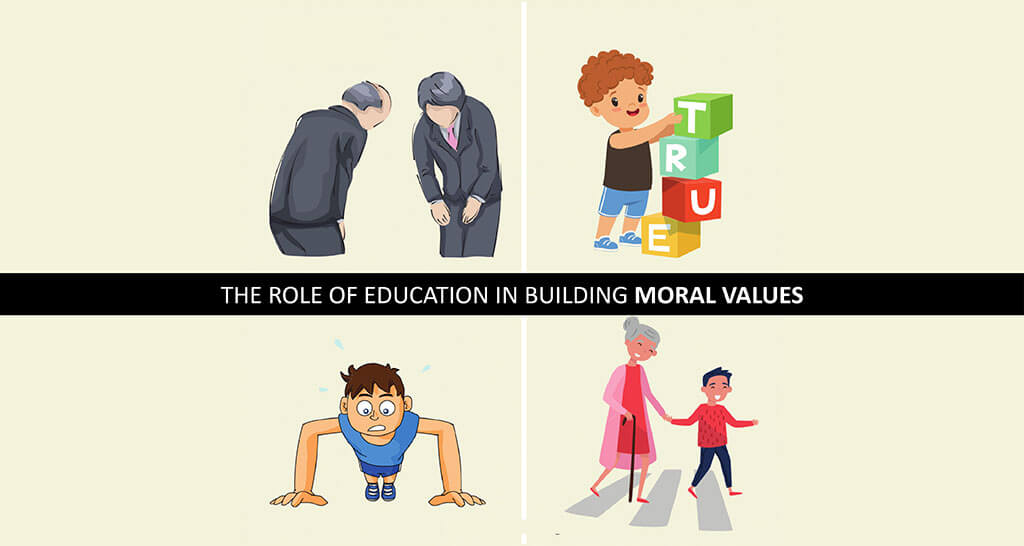Moral values are essential components of a person’s character. They are personality qualities that guide individuals to make judgments and judgements based on their sense of what is right and wrong, based on collective and individual experiences. While moral principles are essential at any age, most individuals have ingrained beliefs throughout their infancy. They are the foundation of each student’s life.
A student’s life is full of obstacles, changes, progress, and evolution. Throughout their school years, developing youngster absorbs many lessons, most of which remain with them for the rest of their lives. Students with strong ethical principles become accountable, responsible, and honest persons, while those who lack moral values become menace to themselves and society.
While there are several advantages to teaching moral principles to our children, the following are a few examples of why it is essential to begin teaching moral values to pupils from a young age.
It Aids in the Development of Strong Character:
Character development occurs due to the qualities and values children acquire throughout their youth, which serve as a solid basis for their moral views in the future. These moral ideals that youngsters ingest become their strengths, on which they may depend to choose their route in life. As a result, the learning years are when great care must be given to teaching these essential principles, which are then refined at school and in life.
It Aids in Differentiating Right From Wrong:
It Aids in Differentiating Right From Wrong: While we notice virtually every day that children might contribute to unwanted conduct such as bullying or test cheating, they frequently do not comprehend the notion of right and wrong. According to studies, youngsters who conduct petty larceny or pilfer either lacked a parent or have no adult supervision to teach them fundamental values. As a result, it is critical to reprimand children when they do anything wrong since they do not comprehend what they are doing until they are taught the distinction between right and wrong. If a youngster is not chastised for little errors, they learn that it is OK to repeat the behaviour. At the same time, even little mistakes might ultimately become a role in poor personality development in youngsters. By teaching your children these qualities, you help them develop a solid foundation of right and evil, allowing them to determine if a situation is ethically acceptable or not. This will aid students in making sound judgments in their life.
Increase Self-Confidence And Positivity:
This self-affirmation of being able to give back or help others, in turn, boosts their self-confidence while also assisting them in developing great sentiments and positive connections in their life.
Forms Attitudes, Beliefs, And Determines Adult Behavior:
Moral principles should be appropriately applied from a young age since the qualities you teach your children today will decide how they act as adults.
Protects against negative peer influence:
Protects against negative peer influence: Peer pressure influences the majority of their choices, from dress to lifestyle. Good moral standards serve as a moral compass, guiding youngsters away from bad influences such as their classmates, social media, and, in general, when they enter their adolescent or adult years. According to several health websites, youngsters who feel good about themselves can withstand negative peer pressure better.
Provides Support in Tough Situations:
Moral principles offer children perspective, make them strong, and instil solid convictions in them, which motivates them to work hard and have bravery when they face problems in life. We hear about the critical issues that today’s youngsters confront virtually every day, such as worry, stress, sadness, and so on. While these difficult circumstances might cause some individuals to struggle, educating youngsters to discriminate between right and wrong, good and evil, helps them make judgments faster, better, and more sensitively. Along with this, moral values provide kids with a strong sense of self and character, which will help them psychologically face any challenging circumstance with resolve.
Conclusion
Moral values are the building elements of personality that help individuals develop better character. It is essential to instil moral ideals in kids since this is when they take their first steps into adulthood, and they must do it correctly. These moral ideals affect their attitudes, beliefs, and ideas, allowing kids to grow into fearless and morally strong persons. Remember that it is our responsibility as parents and caregivers to invest time and effort in instilling these values in our children since children are most influenced by their parents and instructors. Children are excellent observers and mimic what they see. By modelling, you may pass on this great gift of qualities to your children, who will, in turn, pass it on to future generations, eventually making the world a better place.










